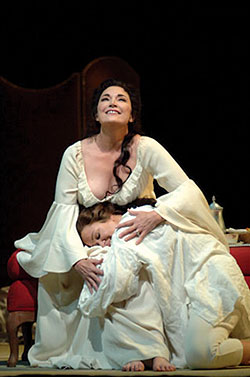The love triangle in Richard Strauss’ Der Rosenkavalier is some sort of multigenerational isosceles: the married Marschallin, Princess von Werdenberg (Carol Vaness); Octavian, her lover as the opera opens, who’s half her age (Alice Coote); and Sophie (Julianne Gearhart), the girl Octavian meets when Sophie’s older fiancé, the Baron Ochs, asks him to act as the Rose Cavalier of the title and convey to her an engagement gift of a silver rose. Mistake.
In Seattle Opera’s current staging, when Octavian first lays eyes on Gearhart as Sophie—all milky-peachy-gold, ravishingly gowned and lit by Bruno Schwengl and Paul Palazzo—it’s over for both Ochs and the Marschallin. Gearhart cleverly plays the character (who in other productions has come off as flighty, not too bright, a shade spoiled) as a younger reflection of her rival. Radiant, poised, inexperienced but already smart enough to know what sort of polished behavior is required in upper-class circles—this, it seems, is exactly what the Marschallin would have been like when she was 15. In this production, the two women are two sides of the same coin: one at dawn, the other seeing her sunset on the horizon. No wonder Octavian falls for her instantly; no wonder their first scene together is so wondrously affecting. Vaness and Gearhart even complement each other vocally, with the former sounding here and there a little rough just as the latter sounds a bit raw, though both voices are capable of soaring beautifully as required.
This is Vaness’ first Marschallin, a role nearly every diva aspires to—regal, thoughtful, eloquent on the subject of aging, wise in realizing her fling with Octavian can’t and won’t last forever. As Vaness plays the role, her key moment comes in the first act, as she admits to Octavian she occasionally gets out of bed to stop all the clocks in her mansion. The orchestra drops out for this line, and Vaness’ voice alone darkens magically and affectingly, as gray clouds seem to roll in from the wings. Though by the final act I was wondering if maybe her Marschallin doth protest just slightly too much—she’s a little distant, even morose. True, she’s playing a woman engineering a breakup, but more warmth might have made the renunciation even more poignant.
Coote, for her part, sings with a clear, smooth, glowing mezzo and plays the most convincingly masculine Octavian I’ve ever seen. More precisely, she plays the part just like a young man would play it—one of those eager, energetic, fresh-from-grad-school tenors or baritones the Seattle Opera Young Artists Program turns up each spring. Peter Rose sings powerfully as Baron Ochs and manages the comic element perfectly. This barren ox is pompous and vulgar, but a person and never a cartoon.
Wolfgang Holzmair sings Faninal (Sophie’s father) with a much more suave and beautiful voice than we’re used to hearing in a character role. Luxury casting is traditional, when the budget allows, for the cameo role of the Italian Singer and his two-minute rococo pastiche aria “Di rigori armato,” and here we get no less a star than Vinson Cole, his voice and delivery fervent and satiny. Director Dieter Kaegi deploys the rest of the large cast effectively to chaotic comic effect.
The orchestra, under Asher Fisch, sounds stunning. Never, not even during last year’s Ring, have I heard the Seattle Symphony fill McCaw Hall so lavishly. (The low-brass blast that opens the third act is worthy of Fafner himself.) On the other hand, never have I heard so many passages where the orchestra needs reining in. Yes, the flute sounds great here, I found myself thinking, but why is it as loud as the soprano onstage? My mole in the pit reports that in rehearsal Fisch called McCaw Hall the greatest opera house in the world. We can probably forgive him for wanting to let the orchestra loose and bask in the sonic splendor.







